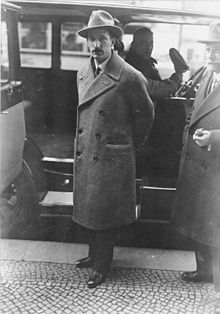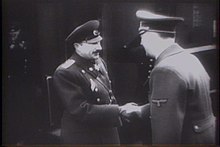Boris III (Bulgaria)
Boris III - Born Boris Klemens Robert Maria Pius Ludwig Stanislaus Xaver Sakskoburggotski, Prince of Tarnowo; bulg. Борис Клемент Роберт Мария Пий Луи Станислав Ксавие Сакскобургготски - (* 30th January 1894 in Sofia ; † 28. August 1943 ) was a member of the House of Saxe-Coburg-Koháry and 1918-1943 Tsar of Bulgaria .
Tsar of Bulgaria since 1918

He was the son of Tsar Ferdinand I and ascended the throne in 1918 when his father abdicated following the defeat of Bulgaria in the First World War . It was the country's second major defeat in just five years after the Balkan Wars in 1913. In the Neuilly-sur-Seine Treaty , Bulgaria had to cede land to its neighbors and pay painful reparations , which threatened political and economic stability.
Two movements, the Agrarian Union and the Communist Party , called for the overthrow of the monarchy and a change of government. Under these circumstances, Boris ascended the throne.
A year after Boris accession to the throne, Aleksandar Stambolijski , a member of the Agrarian Union, was elected Prime Minister . Popular with the numerically strong peasantry, he attracted the hostility of the middle class and the military . As early as April 1923, Boris was privy to the conspiracy plans against the head of government. After the putsch of June 9, 1923, he swore in the new government of the putschists and accepted the "resignation" of Stambolijski's cabinet. The September coup led to a communist uprising known as the September Uprising. On April 16, 1925, the illegalized Communist Party carried out an assassination attempt on Tsar Boris III in the Orthodox Cathedral of Sofia . and the members of the government gathered there. The king escaped the bombing by accident, but over 200 churchgoers were killed.
In 1925 Greece declared war on Bulgaria. Despite the intervention of the League of Nations , the confusion lasted until 1934, when Boris allowed the military to establish a dictatorship . The following year he took control of the country and ruled as an absolute monarch , but later reinstated parliament and gave women the right to vote.
Second World War
At the beginning of the Second World War , the Bulgarian majority sympathized with Germany , which had forced Romania to return the southern Dobruja to Bulgaria. In 1941 Boris III allied himself. with the Axis powers and joined Germany's war against Greece and Yugoslavia in an attempt to regain the territories lost in the Treaty of Neuilly-sur-Seine. Despite his sympathy for Germany, Boris III refused. cooperation with the Nazi regime on two essential points:

At the beginning of 1943 Germany demanded that the Bulgarian Jews be sent to occupied Poland as part of the “ Final Solution to the Jewish Question ” , and for this purpose sent SS Hauptsturmführer Theodor Dannecker to Bulgaria. This initially organized the deportation of over 11,000 Jews in the occupied territories under Bulgarian rule in Thrace and Macedonia . However, when the Bulgarian Jews were also to be deported to the concentration camps, this request led to a public outcry of indignation, led by prominent figures such as the President of the Parliament Dimitar Peschew and Archbishop Stefan von Sofia . Tsar Boris, who had been navigating the deportation issue so far, was forced to act so that the deportation of the 48,000 Bulgarian Jews to the Auschwitz-Birkenau concentration camp could be prevented.
Even more unacceptable to Hitler than the failed annihilation of the Jewish population in Bulgaria was the tsar's refusal to declare war on the Soviet Union , especially when Germany's defeat in the war began to emerge. In August 1943, Hitler invited Tsar Boris III. for a meeting in Berlin . While Boris agreed to a declaration of war against the supposedly distant powers United Kingdom and USA , he in turn refused Bulgaria's participation in the war against the Soviet Union . At Hitler's insistence on entering the war, the tsar is said to have replied that the Bulgarian people would never take up their arms against Russia, to whom they owed their liberation from the 500-year-old Turkish yoke. The tsar also referred to the uncertain attitude of neighboring neutral Turkey . The “symbolic” war against the Western powers led to a catastrophe for the people of Sofia. Your city was massively destroyed by bombing by the Royal Air Force and the United States Air Force in 1943 and 1944 .
Boris III died soon after his return to Sofia. during a hike in the Rila Mountains, presumably from heart failure. In the police report of September 6, 1943 it was recorded that Tsar Boris III. could have been the victim of willful poisoning. His six-year-old son Simeon succeeded the throne .
Tsar Boris III. was buried in the medieval monastery of Rila . After the communists came to power in 1944, they had the body exhumed and buried in the courtyard of the Vrana Palace . After the fall of the communist regime, attempts were made to exhume him again, but only his heart was found, and it was reburied in the Rila Monastery.
Marriage and offspring
On October 25, 1930, Tsar Boris married Princess Giovanna of Savoy (1907-2000), daughter of King Victor Emmanuel III, in Assisi, Italy, according to the Catholic rite . from Italy . After a boat trip from Brindisi , the couple ceremoniously disembarked in Burgas on October 30th and then married in an Orthodox ceremony in Sofia. From this marriage a daughter, Maria Luisa, and in 1937 a son, the heir to the throne Simeon , were born in January 1933 .
Others
Boris III was an avid railroad enthusiast and often ran steam locomotives himself. The magazine Die Lokomotive reports that the Bulgarian railway offered him a train driver's license.
The Borissowa Gradina Park in Sofia is named after him.
To Boris III. is also reminiscent of the name of the Bulgarian fir ( Abies borisii-regis Mattf. ) described in 1925 .
literature
- Michael Bar-Zohar: Beyond Hitler's Grasp. The heroic Rescue of Bulgaria's Jews . Adams, Avon MA 1998, ISBN 1-58062-541-X .
- Hans-Joachim Härtel, Roland Schönfeld: Bulgaria. From the Middle Ages to the present . Verlag Friedrich Pustet u. a., Regensburg 1998, ISBN 3-7917-1540-2 , ( Eastern and Southeastern Europe. History of countries and peoples ).
- Nentscho Iliev: Boris III, King of the Bulgarians . Balgarsko Delo u. a., Sofia 1943.
- Ana Karlsreiter: King Boris III. of Bulgaria and Bulgarian Foreign Policy 1938–1943 . Munich 2001, (Munich, Univ., Diss., 2001).
- Boris III , in: Internationales Biographisches Archiv 11/1962 from March 5, 1962, in the Munzinger archive ( beginning of article freely accessible)
- Wolf Oschlies: Boris III. , in: Biographical Lexicon on the History of Southeast Europe . Vol. 1. Munich 1974, pp. 239-241.
- Helmut Heiber, The Death of Tsar Boris . Institute for Contemporary History Munich, Issue 4, born in 1961.
- Hans-Joachim Böttcher : Ferdinand von Sachsen-Coburg and Gotha 1861 - 1948 - a cosmopolitan on the Bulgarian throne . Osteuropazentrum Berlin - Verlag (Anthea Verlagsgruppe), Berlin 2019, ISBN 978-3-89998-296-1 , pp. 383 - 389 a. v. a.
Web links
- Literature by and about Boris III. in the catalog of the German National Library
- Newspaper article about Boris III. in the press kit 20th Century of the ZBW - Leibniz Information Center for Economics .
Individual evidence
- ↑ Pachanko Dimitrov, "Boris III tsar of Bulgares (1894-1943). Travailleur, citoyen, tsar", Sofia, Ed. Universitaire "Sveti Kliment Ohridski", 1990 (Пашанко Димитров, "Борис ІІІ цар на българите (1894-1943). Труженик, гражданик, гражданин, цефи" 1990), Серис Сиклитя, Серитя ", Серитя", Окефи ", 1990)
- ^ Härtel, Hans-Joachim & Schönfeld, Roland: Bulgaria , Verlag Friedrich Pustet, Regensburg, 1998, p. 189.
- ↑ Text of the police report (Bulgarian)
| personal data | |
|---|---|
| SURNAME | Boris III |
| ALTERNATIVE NAMES | Boris Klemens Robert Maria Pius Ludwig Stanislaus Xaver |
| BRIEF DESCRIPTION | Bulgarian king |
| DATE OF BIRTH | January 30, 1894 |
| PLACE OF BIRTH | Sofia |
| DATE OF DEATH | August 28, 1943 |
| Place of death | Sofia |



